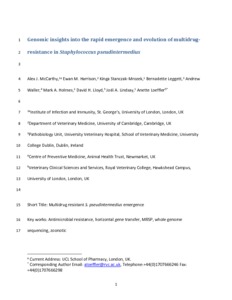McCarthy, AJ; Harrison, EM; Stanczak-Mrozek, K; Leggett, B; Waller, A; Holmes, MA; Lloyd, DH; Lindsay, JA; Loeffler, A
(2015)
Genomic insights into the rapid emergence and evolution of MDR in Staphylococcus pseudintermedius.
J Antimicrob Chemother, 70 (4).
pp. 997-1007.
ISSN 1460-2091
https://doi.org/10.1093/jac/dku496
SGUL Authors: Lindsay, Jodi Anne
![[img]](https://openaccess.sgul.ac.uk/108705/7.hassmallThumbnailVersion/9357.pdf)  Preview |
|
PDF
Accepted Version
Available under License ["licenses_description_publisher" not defined].
Download (1MB)
| Preview
|
Abstract
OBJECTIVES: MDR methicillin-resistant Staphylococcus pseudintermedius (MRSP) strains have emerged rapidly as major canine pathogens and present serious treatment issues and concerns to public health due to their, albeit low, zoonotic potential. A further understanding of the genetics of resistance arising from a broadly susceptible background of S. pseudintermedius is needed. METHODS: We sequenced the genomes of 12 S. pseudintermedius isolates of varied STs and resistance phenotypes. RESULTS: Nine distinct clonal lineages had acquired either staphylococcal cassette chromosome (SCC) mec elements and/or Tn5405-like elements carrying up to five resistance genes [aphA3, sat, aadE, erm(B), dfrG] to generate MRSP, MDR methicillin-susceptible S. pseudintermedius and MDR MRSP populations. The most successful and clinically problematic MDR MRSP clones, ST68 SCCmecV(T) and ST71 SCCmecII-III, have further accumulated mutations in gyrA and grlA conferring resistance to fluoroquinolones. The carriage of additional mobile genetic elements (MGEs) was highly variable, suggesting that horizontal gene transfer is frequent in S. pseudintermedius populations. CONCLUSIONS: Importantly, the data suggest that MDR MRSP evolved rapidly by the acquisition of a very limited number of MGEs and mutations, and that the use of many classes of antimicrobials may co-select for the spread and emergence of MDR and XDR strains. Antimicrobial stewardship will need to be comprehensive, encompassing human medicine and veterinary disciplines to successfully preserve antimicrobial efficacy.
| Item Type: |
Article
|
| Additional Information: |
This is a pre-copyedited, author-produced version of an article accepted for publication in Journal of Antimicrobial Chemotherapy following peer review. The version of record Alex J. McCarthy, Ewan M. Harrison, Kinga Stanczak-Mrozek, Bernadette Leggett, Andrew Waller, Mark A. Holmes, David H. Lloyd, Jodi A. Lindsay, Anette Loeffler, Genomic insights into the rapid emergence and evolution of MDR in Staphylococcus pseudintermedius, Journal of Antimicrobial Chemotherapy, Volume 70, Issue 4, April 2015, Pages 997–1007 is available online at: https://doi.org/10.1093/jac/dku496 |
| Keywords: |
MRSP, antimicrobial resistance, horizontal gene transfer, whole-genome sequencing, zoonotic, Animals, Anti-Bacterial Agents, Biological Evolution, DNA, Bacterial, Drug Resistance, Multiple, Bacterial, Gene Transfer, Horizontal, Genome, Bacterial, Humans, Interspersed Repetitive Sequences, Molecular Sequence Data, Mutation, Sequence Analysis, DNA, Staphylococcus, Animals, Humans, Staphylococcus, DNA, Bacterial, Anti-Bacterial Agents, Sequence Analysis, DNA, Drug Resistance, Multiple, Bacterial, Gene Transfer, Horizontal, Interspersed Repetitive Sequences, Mutation, Genome, Bacterial, Molecular Sequence Data, Biological Evolution, antimicrobial resistance, horizontal gene transfer, MRSP, whole-genome sequencing, zoonotic, 1115 Pharmacology and Pharmaceutical Sciences, 0605 Microbiology, 1108 Medical Microbiology, Microbiology |
| SGUL Research Institute / Research Centre: |
Academic Structure > Infection and Immunity Research Institute (INII) |
| Journal or Publication Title: |
J Antimicrob Chemother |
| ISSN: |
1460-2091 |
| Language: |
eng |
| Publisher License: |
Publisher's own licence |
| Projects: |
|
| PubMed ID: |
25527273 |
| Web of Science ID: |
WOS:000354708600005 |
 |
Go to PubMed abstract |
| URI: |
https://openaccess.sgul.ac.uk/id/eprint/108705 |
| Publisher's version: |
https://doi.org/10.1093/jac/dku496 |
Statistics
Item downloaded times since 13 Feb 2020.
Actions (login required)
 |
Edit Item |



